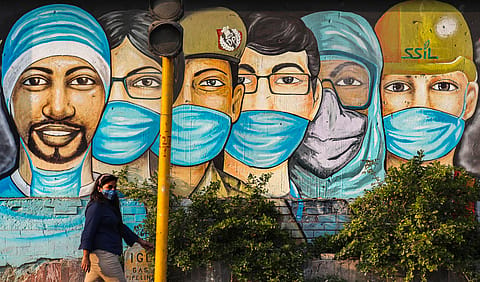First confirmed Omicron XE case in India; WHO says 10% more contagious
The patient, who is a 67-year-old man, had travelled to Gujarat's Vadodara from Mumbai. He suffered from a mild fever on March 12. The genome sequencing of samples showed a confirmed case of XE.

India's first confirmed case of Omicron XE has been detected in Mumbai. The National Centre for Disease Control (NCDC), Delhi, has confirmed the development. Manoj Agarwal, IAS, additional chief secretary, Gujarat health ministry, also said a mutation was observed in the sample, following which it was sent for genome sequencing in Kolkata, where the sample was confirmed as an XE variant of Omicron.
The health ministry, however, has not issued a statement confirming the presence of the XE variant in the country. The patient is a 67-year-old man who had travelled to Gujarat's Vadodara from Mumbai. He had suffered from a mild fever on March 12. The genome sequencing of his samples showed that it's the confirmed case of Omicron XE.
Though the fully-vaccinated individual is stable and fully asymptomatic, the emergence of this highly contagious subvariant of Omicron has created another worry for health officials.
Last week, in what can be called as a major fiasco, the Brihanmumbai Municipal Corporation (BMC) had also stated that it had recorded a case of Omicron XE in women who had a travel history to South Africa. The Centre, however, quickly denied the report, saying it's not XE.
Omicron XE or recombinant is formed when BA.1 and BA.2 sub-variants of Omicron combine together to create a more contagious variant called XE. The World Health Organisation (WHO) has said XE is 10% more contagious than all previous Covid variants.
However, experts in India said there's no reason to indicate that the infection severity has increased anywhere in the country. The U.K. has the highest 637 cases of Omicron XE so far, while cases have been reported in Thailand and now India too.
WHO on Omicron XE
Recommended Stories
“Based on the initial analysis, there's a slight growth advantage of this recombinant over BA.2, about a 10% increase in transmissibility, not 10 times as has been reported by some,” said Maria Van Kerkhove, infectious disease epidemiologist and COVID-19 technical lead at the WHO.
She said surveillance of the XE subvariant is important though there's no reason to worry. For India, experts believe that natural herd immunity and additional protection provided by booster Covid shots should wane its impact if at all it emerges in the country. Moreover, XE is not the only recombinant subvariant out there. Before this, Deltacron had emerged from Delta and BA.1 infections.
Booster shots for all adults
The government has allowed the precautionary or booster Covid-19 dose for all above 18 years of age from April 10 across private vaccination centres of the country. So all above 18 years of age, and those who have completed 9 months after taking the second Covid-19 dose, are eligible for this booster shot across private centres. The ministry has said the ongoing free vaccination programme through government vaccination centres will continue and will be accelerated.
(INR CR)
The Centre has also slashed the prices of both Covaxin and Covishield doses that are being administered at private health facilities. So now, Hyderabad-based Bharat Biotech's Covaxin, which earlier cost ₹1,200 across private hospitals, will cost ₹225 per dose. Similarly, Serum Institute's Covishield was priced at ₹600 per dose, which has also been reduced to ₹225 per dose.